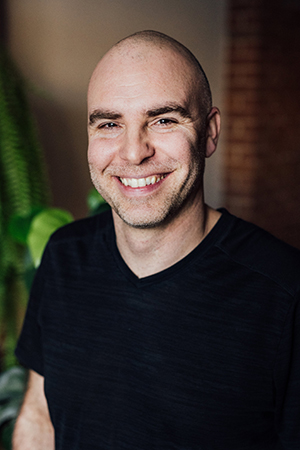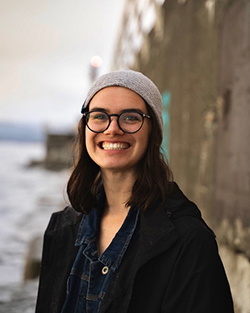Finding Escape: Sarah Androsoff in Conversation with Daniel Allen Cox

Daniel Allen Cox, whose creative nonfiction piece "The Glow of Electrum" appears in The Malahat Review's summer issue #211, discusses driving for specificity, writing and editing as different disciplines, and the mental contortions required to believe—and then disbelieve—in Armageddon and Paradise in his Q&A with Malahat Review volunteer Sarah Androsoff.
Daniel Allen Cox's essays appear in The Malahat Review, Fourth Genre, The Rumpus, and elsewhere. He is the author of four novels published by Arsenal Pulp Press and is working on a memoir-in-essays about growing up a Jehovah’s Witness. Daniel lives in Tiotia:ke/Montréal and is represented by Akin Akinwumi at Willenfield Literary Agency. @danielallencox on Twitter.
[Photo credit Alison Slattery.]
You write with such specificity and detail in “The Glow of Electrum.” One section that stood out for me: “An inherited acoustic guitar sits atop one of my bookshelves, a taunt. I often find myself gazing up at it; the dusty curves, the wood panels where someone’s palm sweat has soaked through.” This echoes the description of the sweat-stained wooden lectern used for Bible talks, referenced earlier in the piece, and draws a link between the two with connotations of ritual and performance. Are connections like these made while you write, or do you have them in mind before you begin? What does your writing and editing process look like?
Over the years, I’ve learned to separate writing and editing and enjoy them as different disciplines. When I write first drafts—usually blasting music for rhythm—I’ll follow the whiff of an idea or the fuzzy edge of an argument deep into the bass, and connections mostly happen by accident. I’ll realize while I’m typing them. Sometimes I script these confluences beforehand, but my outlines usually operate at a higher level. It’s become a cliché to say that first drafts need the freedom to be imperfect. Instead I’ll say that writers need to set up conditions where perfect accidents can happen. For me, editing is the zone. I’ll circle dozens of times to trace the writing’s own music and find more of these connections. It’s the ritual and performance you mention.
Driving for specificity helps an essay interrogate “how the particular connects to the general,” as Rebecca Solnit puts it. It’s easy to feel like a failure at this. The world, and personal experience, are infinitely specific, and you can make infinite links in a piece. Maybe it’s okay to have the feeling that you can’t do the work alone. After all, the reader is implicit in making connections between the particular and the general. The writer can assist by producing a text of dynamic possibilities, not all of which are immediately apparent.
For a piece that deals with such heavy topics as control and religion, I found a lot of humour in your writing! In particular, in one of the first paragraphs: “Don’t say Stuttering, say Childhood Onset Fluency Disorder. Thank you, American Psychiatric Association. I’ll use whichevercomes out first.” And again later: “You approach a consonant with a slow buildup of voice, the same way you would creep up the walkway to someone’s front door with a Watchtower magazine.” How important is humour in your work? Do you consciously insert it in your writing, or does it surface by itself?
Humour isn’t top of mind when I write. It usually comes out subconsciously, and it doesn’t always strike me as humour right away. I’d like to become more aware of humour in my work as a way to reframe perspective, and both create and diffuse tension and seriousness.
I was corresponding with author Joy Castro about our lives outside the Jehovah’s Witnesses, and she wrote, “The conditions of our lives were just as strange as fiction: so fascinating and weird—and ruinously destructive of human potential.” So true. How could I write about the surreal aspects of my upbringing without using humour? For example, it’s the only way I can describe the time in the 80s when Witnesses panicked over Smurfs, thinking they were possessed by demons, which I cover in another essay.
You say, “Back when I was a Jehovah’s Witness, unable to see beyond the ideological confines of my life, I couldn't have known that my stutter was my ticket out.” Your bio says you’re working on a memoir-in-essays about growing up a Jehovah’s Witness. Will the other essays focus on similar themes (identity, music, stuttering)? Could you tell us more about the project?
My memoir in essays is about the lifelong act of leaving the Jehovah’s Witnesses. It’s a queer book. During my childhood and adolescence, the end of the world was a tangible place, and I’ve tried to make that vivid for the reader by writing a text as feverish as anything the organization has ever produced. It’s a book of questions. What mental contortions are required to believe—and then disbelieve—in Armageddon and Paradise? Can brainwashing ever be completely undone? If finding escape means finding the language for it, how can I redefine “apocalypse” and other words I’ve tuned out? How did religious shunning ultimately kill two of my friends, and what is the Watch Tower’s accountability in that?
“The Glow of Electrum” is the only essay in the collection that focusses on stuttering, but the assembly of memoir fragments could itself be a giant stutter. The way in which I remembered past events shaped the fluency of the book, and the nonlinear structure influences the reading. At least two other essays in the collection—featuring Michael Jackson and Prince, both former Witnesses—deal in music.
Leonard Cohen is an important figure in this piece, and you include many of his words that resonate with you. Are there other writers and artists who influence your creative nonfiction work? What are you reading right now?
Long Live the Tribe of Fatherless Girls by T Kira Madden, In the Dream House by Carmen Maria Machado, and How to Write an Autobiographical Novel by Alexander Chee are stunning memoirs whose structure and unique unfolding have taught me much about how to address the scary aspects of queer life and the ways a heart can open. I love how Amber Scorah portrays the role of language as a mind awakens in her memoir Leaving the Witness: Exiting a Religion and Finding a Life. Joy Notoma, another former Witness, also teases that out in surprising turns in her essays.
Brandon Taylor’s novel Real Life is such a powerful place to reflect on racism, white supremacy, and complicity and I’ve asked my white friends to read it. Sarah Schulman’s work has changed everything I know about learning to be accountable, keeping communication open, and fulfilling the duty of repair. Both her fiction and nonfiction are infused with these lessons. For resistance to linearity and unlearning imposed narrative structure, Mattilda Bernstein Sycamore, always. The musicality of Sketchtasy is enough to unfasten any writer from positions of too much safety. I can’t wait for her upcoming book The Freezer Door.
I also look forward to starting A History of My Brief Body by Billy-Ray Belcourt, Luster by Raven Leilani, and Later: My Life at the Edge of the World by Paul Lisicky.

Sarah Androsoff
* * * * * * * *









